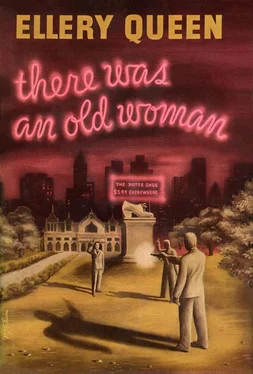Cornelia Potts had not always been the Old Woman. Once she had actually been a child in a small town in Massachusetts. She was a ragged Ann, driven from child-hood by a powerful purpose. It was to be rich and to live upon the Hill. It was to be rich and to live upon this Hill and any hill that was higher than its neighbor. It was to be rich and to multiply.
Cornelia became rich and she multiplied. She became rich almost wholly through her own efforts; to multiply, unhappily, it was necessary to enlist the aid of a husband, God having so ordered the creation. But the least Cornelia could do was improve upon the holy ordinance. This she did by taking, not one, but two husbands; and thus she multiplied mightily, achieving six children — three by her first husband, and three by her second — before that other thing happened which God has also ordained.
(“The second husband,” said Charley Paxton, “is still around, poor sap. I’ll get to him in due courses.”)
Husband the First was trapped by Cornelia in 1892, when she was twenty and possessed the dubious allure of a wild-flower growing dusty by the roadside. His name was Bacchus, Bacchus Potts. Bacchus Potts was that classic paradox, a Prometheus bound — in this case, to a cobbler’s bench, for he was the town shoemaker, a man of whom all the girls in the village were gigglingly afraid, for by night he wandered in the woods and sang rowdy songs under the moon while his feet danced a dance of impotent wanderlust.
It has been said of the Old Woman (said Charley) that if she had married the village veterinary, she would have turned him into a Pasteur; if she had married the illegitimate son of an illegitimate son of an obscure sprig of the royal tree, she would have lived to be queen. As it was, she married a cobbler; and so, in time, she made him the leading shoe manufacturer of the world.
If Bacchus Potts dreamed defeated dreams over his bench, it was surely not of larger benches; but larger benches he found himself possessor of, covering acres and employing thousands. And it happened so quickly that he, the dreamer, could not grasp its dreamlike magic; or perhaps he wished not to. For as Cornelia invested his life’s savings in a small factory; as it fed, and bulged, and by process of fission became two, and the two became four... Bacchus could only sit helplessly by, resenting the miracle and its maker.
Every so often he would vanish. When he returned, without money, dirty, and purged, he crept meekly back to Cornelia with the guilty look of a repentant tomcat.
After some years, no one paid any attention to Bacchus’ goings or comings — not his employees, not his children, certainly not his wife, who was too busy with building a dynasty.
In 1902, ten years after their marriage, when Cornelia was a plump and settling thirty, and the Pottses owned not only factories but retail stores over all the land, Bacchus Potts one day dreamed his greatest dream. He disappeared for good. When months passed and he did not return, and the authorities failed to turn up any trace of him, Cornelia shrugged him off and became truly Queen of Egypt land. After all, there was a great deal of work involved in building a pyramid, and she had three growing children to care for between crackings of the overseer’s whip. If she missed Bacchus, it was not for any reason discernible in daylight.
Then came the seven fat years, at the expiration of which the queen exhorted the lawmakers; and the law, that stern Pharaoh, being satisfied, Bacchus Potts was pronounced no longer a living man but a dead one, and his wife no longer a wife but a widow, able to take to herself without contumely another husband.
That she was ready and willing as well became evident at once.
In 1909, at the age of thirty-seven, Mrs. Potts married another shy man, Stephen Brent, to whom even at the altar she flatly refused to give up her name. Why she should have felt a loyalty to that first fey spouse upon whom she had founded her fortune remained as much a mystery as everything else about her relationship with him; or perhaps there was no loyalty to Bacchus Potts, or sentiment either, but only to his name, which was a different thing altogether, since the name meant the Potts Shoe, $3.99 Everywhere.
Cornelia Potts not only refused to give up her name, she also insisted as a condition of their marriage that Stephen Brent give up his. Brent being the kind of man to whom argument is an evil thing, to be shunned like pestilence, feebly agreed; and so Stephen Brent became Stephen Potts, according to legal process, and the Potts dynasty rolled on.
It should be remembered (Charley Paxton reminded Ellery) that in December of 1902 Cornelia had moved her three fatherless children to New York City and built a house for them — the Potts “Palace,” that fabulous square block of granite and sward on Riverside Drive, facing the gentle Hudson and the smoky greenery of the Jersey shore. So Cornelia had met Steve Brent in New York.
“It’s a wonder to me,” growled the young attorney, “that Steve tore himself away from Major Gotch long enough to be alone with the old girl and ask her to marry him — if he did ask her.”
Stephen Brent had come to New York from the southern seas, or the Malay Peninsula, or some such romantic place, and with him, barnacle-like, had come Gotch — two vagabonds, of the same cloth, united by the secret joy of idleness and tenacious in their union. They were not bad men; they were simply weak men; and men of weakness seemed to be Cornelia’s weakness.
Perhaps this was why, of the two wanderers, she had chosen Steve Brent to be her prince consort, and not Major Gotch; for Major Gotch evinced a certain minor firmness of fiber, not exactly a strength but a lesser weakness, which happily his friend did not possess. It was this trait of his character which enabled him to stand up to Cornelia Potts and demand sanctuary with his Pythias. “Marry Steve — yes, ma’am. But Steve, he’ll die without me, ma’am. He’s just a damn’ lonesome man, ma’am,” Major Gotch had said to Cornelia. “Seeing that you’re so well-fixed, seems to me it won’t ruffle your feathers none if I sort of come along with Steve.”
“Can you garden?” snapped Cornelia.
“Now don’t get me wrong,” said Major Gotch, smiling. “I ain’t asking for a job, ma’am. Work and me don’t mix. I’ll just come and set. I got a bullet in my right leg makes standin’ something fierce.”
For the first time in her life Cornelia gave in to a man. Or perhaps she had a sense of humor. She accepted the condition, and Major Gotch moved right along in and settled down to share his friend’s incredible fortune and make himself, as he liked to say, thoroughly useless.
“Was Cornelia in love with Stephen?” asked Ellery.
“In love?” Charley jeered. “Say, it was just animal magnetism on Cornelia’s part — I’m told Steve had ‘pretty eyes,’ though they’re washed-out now — and a nice business deal for old Steve. And it’s worked out not too badly. Cornelia has a husband who’s given her three additional children, and Steve’s lolled about the rich pasture after a youth of scratching for fodder. Fact is, he and that old scoundrel Major Gotch spend all their time together on the estate, playing endless games of checkers. Nobody pays any attention to them.”
“The three children of the Old Woman’s first marriage — the offspring of Cornelia and the ‘teched’ and vanished Bacchus Potts — are crazy,” Charley continued.
“Did you say ‘crazy’?” Ellery looked startled.
“You heard me.” Charley reached for the decanter.
“But Thurlow—”
“All right, take Thurlow,” argued young Mr. Paxton. “Would you call him sane? A man who spends his life trying to hit back at people for imaginary insults to his name? What’s the difference between that and a mania for swatting imaginary flies from your nose?”
Читать дальше












